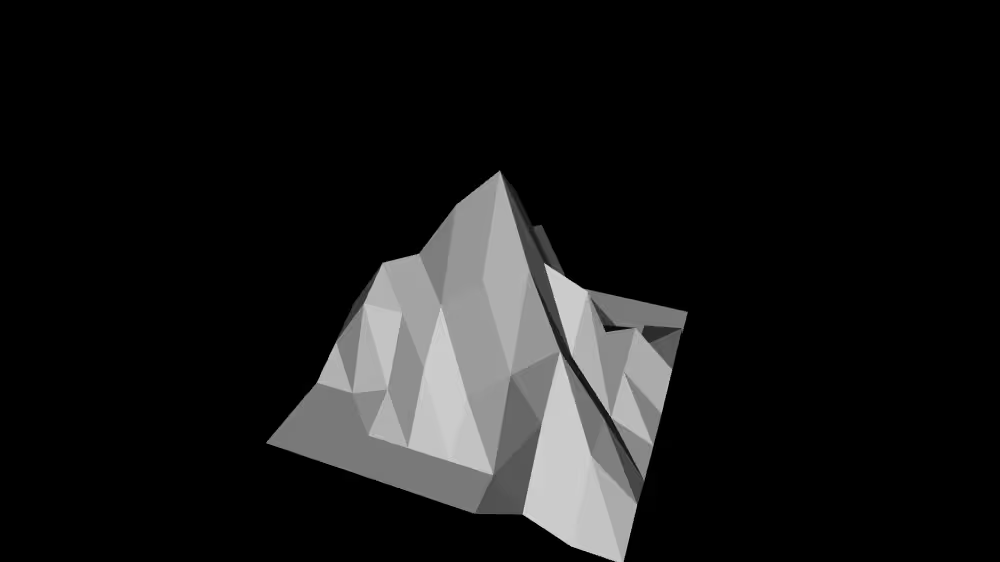Building Elevation Grids
Building Elevation Grids
Motivation
- Building terrains is very common
- Hills, valleys, mountains
- Other tricky uses…
- You can build a terrain using an IndexedFaceSet node
- You can build terrains more efficiently using an ElevationGrid node
Syntax: ElevationGrid
An ElevationGrid geometry node creates terrains:
- xDimension and zDimension - grid size
- xSpacing and zSpacing - row and column distances
XML Encoding
1
2
3
4
5
6
7
8
9
<Shape>
<Appearance><!-- ... --></Appearance>
<ElevationGrid
xDimension='3'
zDimension='2'
xSpacing='1.0'
zSpacing='1.0'
... />
</Shape>
Classic VRML Encoding
1
2
3
4
5
6
7
8
9
10
Shape {
appearance Appearance { ... }
geometry ElevationGrid {
xDimension 3
zDimension 2
xSpacing 1.0
zSpacing 1.0
...
}
}
An ElevationGrid geometry node creates terrains:
- height - elevations at grid points
XML Encoding
1
2
3
4
5
6
7
<Shape>
<Appearance><!-- ... --></Appearance>
<ElevationGrid
...
height='0.0, -0.5, 0.0,
0.2, 4.0, 0.0'/>
</Shape>
Classic VRML Encoding
1
2
3
4
5
6
7
8
9
10
Shape {
appearance Appearance { ... }
geometry ElevationGrid {
...
height [
0.0, -0.5, 0.0,
0.2, 4.0, 0.0
]
}
}
An ElevationGrid geometry node creates terrains
- solid - shape is solid
- ccw - faces are counter-clockwise
XML Encoding
1
2
3
4
5
6
7
<Shape>
<Appearance><!-- ... --></Appearance>
<ElevationGrid
solid='true'
ccw='true'
... />
</Shape>
Classic VRML Encoding
1
2
3
4
5
6
7
8
Shape {
appearance Appearance { ... }
geometry ElevationGrid {
...
solid TRUE
ccw TRUE
}
}
A sample elevation grid
XML Encoding
1
2
3
4
5
6
7
8
9
10
11
12
13
14
15
16
17
18
<Shape>
<Appearance><!-- ... --></Appearance>
<ElevationGrid
xDimension='9'
zDimension='9'
xSpacing='1.0'
zSpacing='1.0'
solid='false'
height='0.0, 0.0, 0.5, 1.0, 0.5, 0.0, 0.0, 0.0, 0.0,
0.0, 0.0, 0.0, 0.0, 2.5, 0.5, 0.0, 0.0, 0.0,
0.0, 0.0, 0.5, 0.5, 3.0, 1.0, 0.5, 0.0, 1.0,
0.0, 0.0, 0.5, 2.0, 4.5, 2.5, 1.0, 1.5, 0.5,
1.0, 2.5, 3.0, 4.5, 5.5, 3.5, 3.0, 1.0, 0.0,
0.5, 2.0, 2.0, 2.5, 3.5, 4.0, 2.0, 0.5, 0.0,
0.0, 0.0, 0.5, 1.5, 1.0, 2.0, 3.0, 1.5, 0.0,
0.0, 0.0, 0.0, 0.0, 0.0, 0.0, 2.0, 1.5, 0.5,
0.0, 0.0, 0.0, 0.0, 0.0, 0.0, 0.5, 0.0, 0.0,'/>
</Shape>
Classic VRML Encoding
1
2
3
4
5
6
7
8
9
10
11
12
13
14
15
16
17
18
19
20
21
Shape {
appearance Appearance { ... }
geometry ElevationGrid {
xDimension 9
zDimension 9
xSpacing 1.0
zSpacing 1.0
solid FALSE
height [
0.0, 0.0, 0.5, 1.0, 0.5, 0.0, 0.0, 0.0, 0.0,
0.0, 0.0, 0.0, 0.0, 2.5, 0.5, 0.0, 0.0, 0.0,
0.0, 0.0, 0.5, 0.5, 3.0, 1.0, 0.5, 0.0, 1.0,
0.0, 0.0, 0.5, 2.0, 4.5, 2.5, 1.0, 1.5, 0.5,
1.0, 2.5, 3.0, 4.5, 5.5, 3.5, 3.0, 1.0, 0.0,
0.5, 2.0, 2.0, 2.5, 3.5, 4.0, 2.0, 0.5, 0.0,
0.0, 0.0, 0.5, 1.5, 1.0, 2.0, 3.0, 1.5, 0.0,
0.0, 0.0, 0.0, 0.0, 0.0, 0.0, 2.0, 1.5, 0.5,
0.0, 0.0, 0.0, 0.0, 0.0, 0.0, 0.5, 0.0, 0.0,
]
}
}
Example

Summary
- An ElevationGrid node efficiently creates a terrain
- Grid size is specified in the xDimension and zDimension fields
- Grid spacing is specified in the xSpacing and zSpacing field
- Elevations at each grid point are specified in the height field
This post is licensed under CC BY 4.0 by the author.